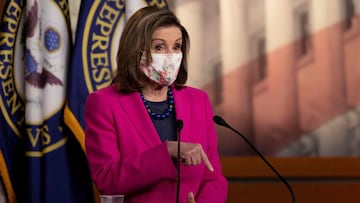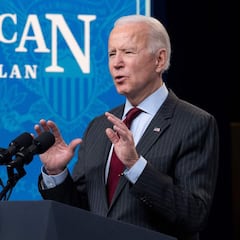House approves Biden relief bill: what are the next steps and when will stimulus check will passed?
The House of Representatives passed Joe Biden's $1.9 trillion relief package on Saturday but the bill still has to face the Senate before being passed into law.

The US House of Representatives passed Joe Biden’s $1.9 trillion American Rescue Plan legislation on Saturday, paving the way for the president’s covid-19 stimulus package to be sent to the floor of the Senate for debate. The bill was approved in the House by a margin of 219-212 with the vote split largely along party lines. However, in a development that may have some bearing on the Senate debate there was dissent among House Democrats with Kurt Schrader of Oregon and Jared Golden of Maine voting against the bill.
In order to push the legislation through the Senate - where it will face opposition from Republicans unsure about the mathematics of the relief package and the ability of the federal coffers to absorb the financial impact – the bill will need the support of every Democrat and independent in the 100-seat chamber. Vice President Kamala Harris’ tie-breaking vote in the Senate gives Democrats a slight edge but any refusal to fully toe the party line on the bill cold prove fatal to its chances of being passed into law.
Among senior Democrats to join Republicans in voicing their reticence is Sen. Joe Manchin of West Virginia, who has questioned the inclusion of a hike in the federal minimum wage to $15 an hour, to be implemented by 2025. Manchin has also previously suggested he would oppose another round of stimulus checks.
The minimum wage increase is one of several articles in the legislation that will face Senate scrutiny in the coming days as the bill is debated and, in all likelihood, altered quite significantly from the text of the American Rescue Plan that passed the House on Saturday.
What does the American Rescue Plan contain?
This is the moment the U.S. House passed President Biden’s $1.9 trillion pandemic-relief plan, spanning $1,400 stimulus checks, enhanced jobless benefits and fresh funding for vaccines and testing.
— Bloomberg Quicktake (@Quicktake) February 27, 2021
The bill faces significant challenges in the Senate https://t.co/fEltKmT28c pic.twitter.com/qwF897oHpd
Biden unveiled his plan on the day he took office, 20 January. Describing the bipartisan release of $900m in federal funding approved in December as a down payment, the American Rescue Plan seeks to tackle the public health crisis caused by covid as well as addressing the knock-on social and economic effects of the coronavirus pandemic.
Among the goals set out in the plan are setting up a national covid-19 vaccine program, providing $130 billion in funding to safely reopen schools, ramping up testing with a $50b expansion effort, increasing the public health workforce by 100,000 people, addressing disparities in the availability of public health services for US citizens, providing extra support for care home staff, pumping a further $30b into the Disaster Relief Fund, setting up a covid-19 Protection Standard for workers, approving emergency paid leave for 106 million workers to combat the spread of covid-19 and providing another round of stimulus checks to US households in the wake of job losses topping 10 million since the pandemic struck while also extending unemployment benefits for around 18 million people.
In total, the American Rescue Plan would allocate some $1 trillion to working families with the aim of cutting child poverty in the US by half, a goal that Colombia University researchers have said is attainable.
Biden’s relief bill: what happens now?
This is a once-in-a-century health and economic crisis
— Chuck Schumer (@SenSchumer) February 25, 2021
But Republican leaders are reportedly “maneuvering” to get every single Republican member to oppose urgent, bold COVID relief
But make no mistake—We will deliver the American Rescue Plan with overwhelming public support
Speaking after the House passed the bill on Saturday, Senate Majority Leader Chuck Schumer said: “We will deliver the American Rescue Plan with overwhelming public support.”
Lawmakers will begin the process of amending the bill next week with the minimum wage likely to be the main bone of contention. Senior Democrats including House Speaker Nancy Pelosi and Bernie Sanders have vowed to ensure the new $15 rate is included in the final bill but the Democrats’ use of budget reconciliation to try and push the legislation through means that there will be omissions from any eventual deal with the minimum wage expected to be first to go.
When the Senate has drafted an amended bill it will either pass back to the House for another vote or the two parties will have to put their heads together to agree on a deal that meets the approval of both sides.
The key date for Democrats is 14 March, when federal unemployment benefits agreed in the last tranche of emergency legislation come to an end.
When could a new round of stimulus checks be sent out?
Stimulus check updates: Democrats await Senate decision on minimum wage provision in COVID-19 relief package https://t.co/6jb2moxQlP
— Chicago Tribune (@chicagotribune) February 25, 2021
Related stories
Biden promised to make another round of stimulus checks his priority when he assumed office but Donald Trump’s impeachment process saw Congress otherwise engaged in the first weeks of his presidency. With lawmakers now focused on the relief bill, the timeline will depend on when the legislation is passed and signed into law.
The proposal passed in the House is unlikely to sail through the Senate unopposed but if there is not too much wrangling on the content of the bill and it is passed swiftly in the upper chamber, or on its return in amended form to the House, experts have suggested the first issues of a fresh round of checks could start in late March.

